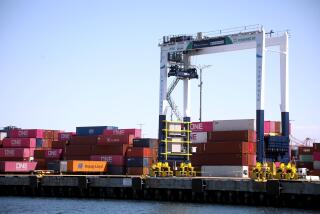PERSPECTIVES ON BASE CLOSURES : A Five-Point Plan for Survival : We need tax credits, flexible matching funds, targeted aid, clean bases and help through the bureaucratic maze.
- Share via
Today in Washington, the California Congressional delegation’s Defense Conversion Task Force, which I co-chair, will announce its recommendations on defense conversion. The task force’s major challenge is to create partnerships between federal and local government, our industries, our workers and our communities. It is only through partnerships that we can address California’s top three priorities--jobs, jobs, jobs.
The economic conversion plan contains five key recommendations:
* Conversion clearinghouse. The major problem at the federal level is to cut through the bureaucracy and expedite the efforts of the 23 federal agencies. Our small subcontractors, local council members and unions should not have to hire platoons of lobbyists to crisscross Washington in search of a useful program. A “one-stop-shop” conversion clearinghouse within the Commerce Department will result in comprehensive assistance.
* Targeted assistance. The purpose of defense conversion is to help dislocated workers, defense-dependent businesses and communities feeling the pain of defense cuts. Because the resources are limited, we must ensure that economic conversion funds reach the communities most affected by defense cuts. California, which has shouldered a large share of defense cuts, must get its fair share of conversion funds.
Specifically, all conversion funds should be targeted to areas with heavy job losses and those areas with the greatest reductions in defense dollars.
* Flexible matching funds. Many federal-grant programs require matching funds. Local governments and many businesses may find themselves unable to participate in conversion unless the matching requirements are restructured. There should be greater flexibility, allowing for in-kind contributions, reducing the cash match or even waiving it.
* Targeted tax credits. We need a new targeted defense conversion investment-tax credit that encourages firms to retrain workers, develop new products and retool their facilities to use excess capacity as they convert.
* Base cleanup and reuse. We can all talk about the importance of reusing bases, but we will never be able to if they are not cleaned up. Ten of the 28 California bases proposed for closure also appear on the Superfund National Priorities List. The Defense Department must go beyond studying and begin fixing it. This will require adequate funding and standardized clean-up and disposal functions to transform the various services into “user-friendly” resources for communities.
In addition to these recommendations, we must fight to secure funding for dual-use projects in California.
An outstanding example is Northrop’s “stealth bus,” an advanced technology bus made from composite materials developed for the stealth bomber. These materials make the vehicle lighter and more fuel-efficient. If we can build a bomber, we can build a bus.
Titan Communications of San Diego is working on new uses for advanced computer and software technologies. Their “disaster-training module” tests responses to simulated natural disasters.
California’s electric-vehicle consortium, CALSTART, is developing an electric-vehicle program in cooperation with state and regional agencies and businesses, including Hughes Aircraft. CALSTART, housed in a former Lockheed warehouse in Burbank, will retrain former aerospace workers.
The California Congressional delegation is working closely with the Advanced Research Project Agency to promote the many dual-use technologies expected from the California defense industry.
Commerce Secretary Ron Brown has pledged to make conversion a priority. The delegation will continue working closely with the Administration to help our industries compete in this increasingly competitive global economy.
With almost 1 million Californians out of work, it is essential that we do whatever it takes to put the federal conversion programs to work for the people of California.
More to Read
Get the L.A. Times Politics newsletter
Deeply reported insights into legislation, politics and policy from Sacramento, Washington and beyond. In your inbox twice per week.
You may occasionally receive promotional content from the Los Angeles Times.










